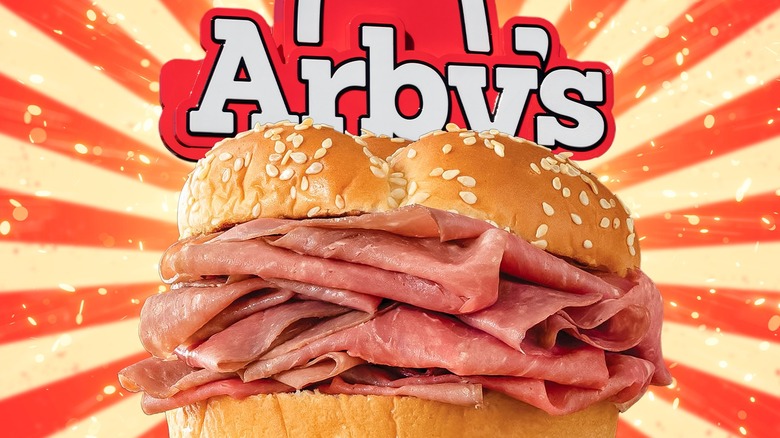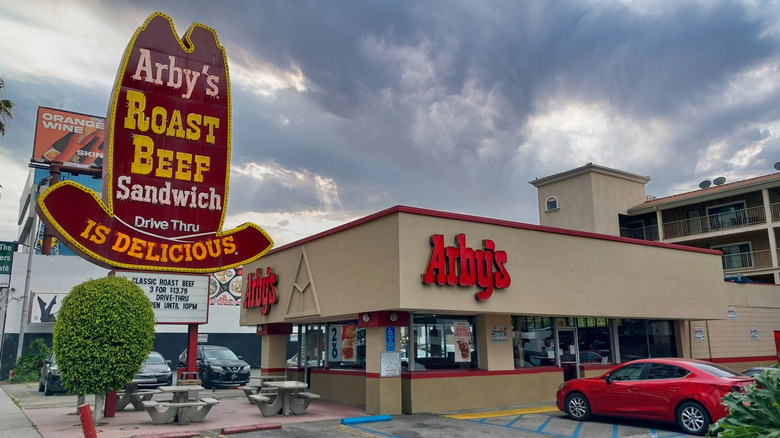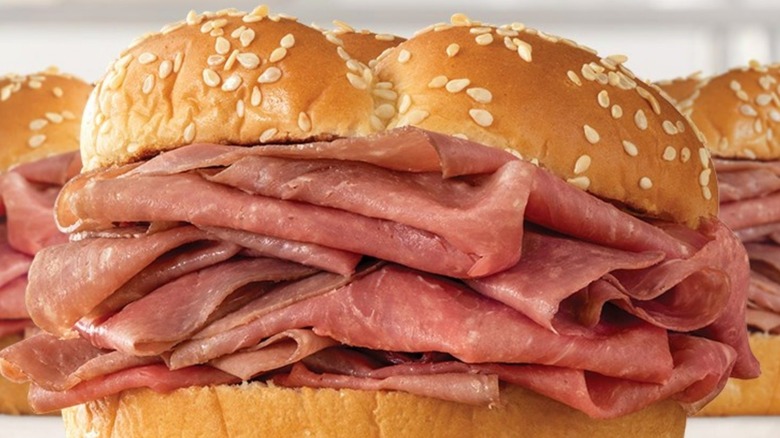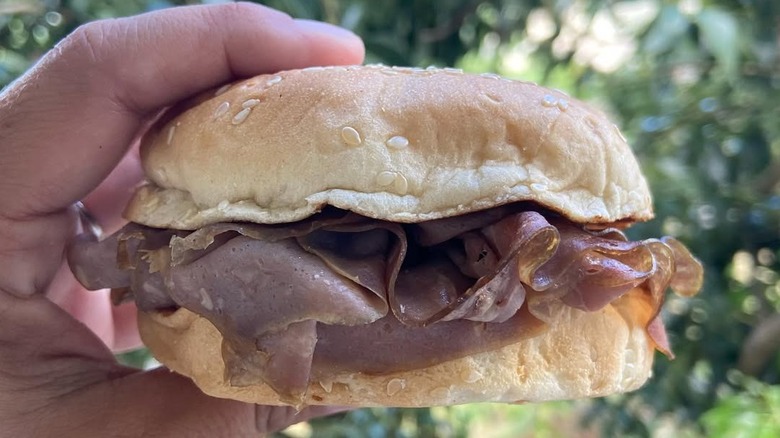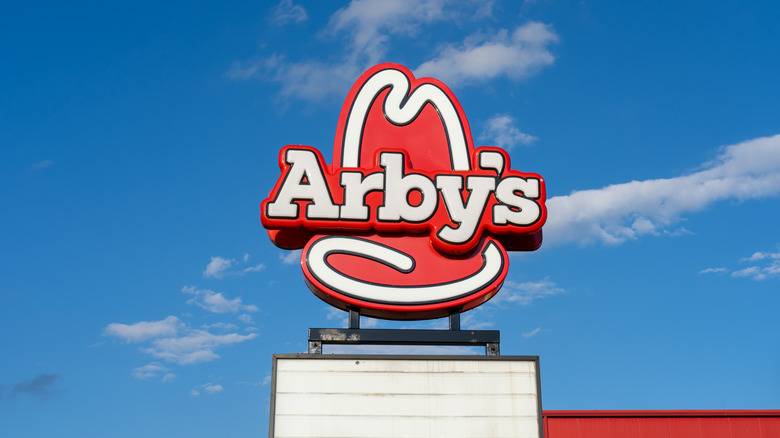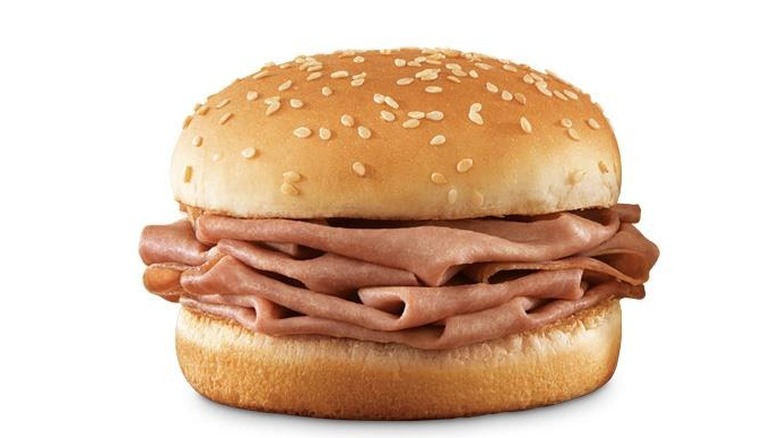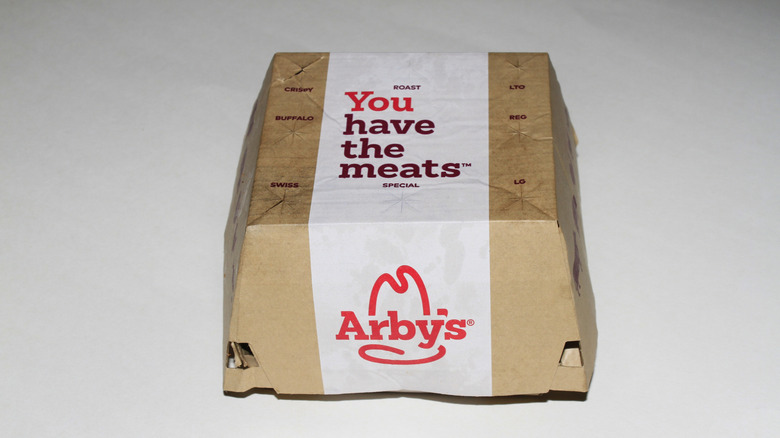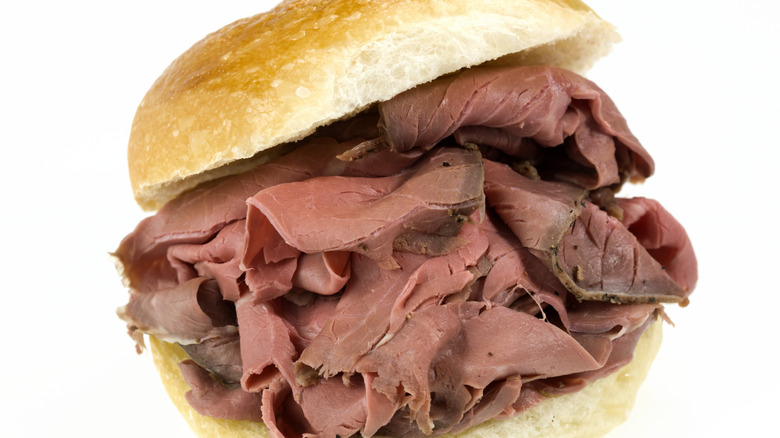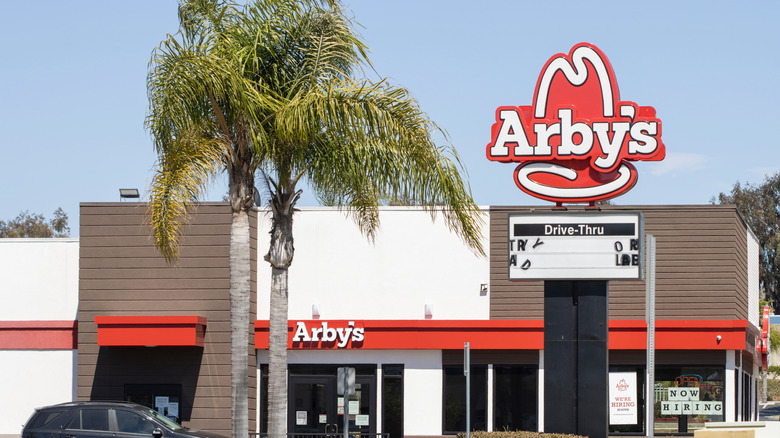12 Facts About Arby's Classic Roast Beef Sandwich You Should Know
When it comes to fast food, burgers may steal the spotlight — but Arby's classic roast beef sandwich, one of the chain's original menu items, has quietly built a legacy of its own. Since 1964, this humble yet beloved sandwich has been the heart of a brand that dared to offer something different. Founders Leroy and Forrest Raffel set out to offer an alternative to the hamburger-centric fast food scene, and they certainly succeeded. Whether you love the paper-thin beef slices, the signature tangy sauce, or the pillow-soft sesame seed buns that squish just right, this sandwich has earned its legendary status.
The numbers back it up, too. Arby's ranks among QSR Magazine's top 50 fast food chains in the U.S and generated an impressive $4.617 billion in sales in 2023. Not bad for a place built around a single sandwich that originally sold for under a dollar right?
You may know some facts about Arby's, but just how much do you really know about the sandwich that started it all? From myths and legal battles to literal finger-pointing, this sandwich has cemented itself into fast-food culture for good and bad reasons. Get the scoop with these 12 juicy facts we thought you should learn before your next order or visit.
Arby's classic sandwich cost four times more than Big Macs when it debuted
The year was 1964, and while America was busy chasing burgers for pocket change, Arby's founders, who were previously in the restaurant equipment business, were cooking up something different. On July 23, in Boardman, Ohio, the very first Arby's opened its doors, and with it came a new kind of fast food: the classic roast beef sandwich, served on a dimpled, sesame seed Schwebel's egg bun, toasted and buttered to perfection.
But what turned heads? The price tag. At 69 cents, it was more than four times the cost of a McDonald's hamburger at the time. Co-founder Leroy Raffel admitted in a WFMJ interview that the goal was to attract a higher-end caliber of clientele who wanted something a little more refined than the average fast food experience. "On the day we opened, the McDonald's hamburger was 15 cents and our sandwich was 69 cents," he stated, "so you had to be a little more affluent to buy our sandwich."
While 69 cents may seem modest today, in 1964 it was enough to set Arby's apart as a sandwich for people who wanted something fast but a little more refined. Today, you'll find that same sandwich served at over 3,282 Arby's locations across the U.S. (though not in Vermont or Rhode Island). It's endured changing tastes, rising costs, and shifting menus.
Nope, the meat used in Arby's classic roast beef isn't fake or liquid
Of all the rumors floating around about fast food restaurants, few are persistent or bizarre, as the claim that the meat used in Arby's classic roast beef sandwich isn't real beef. Scroll through Reddit, Quora, or random Facebook threads, and you'll find folks swearing the meat is some kind of processed liquid, gel, or paste.
So, is there any truth to it? Not really. This idea likely stems from the fact that the meat is shipped in sealed plastic bags containing both the beef and a self-basting solution designed to keep it moist and flavorful during the slow-roasting process. In the past, Arby's quality assurance spokespeople have clarified the meat is 100 percent beef, not a synthetic or artificially reconstructed product. The basting solution is simply a mix of water and seasonings.
Despite official statements, speculation continues to swirl online. On Facebook, users debate whether the roast beef is "processed" or "real," with some insisting it tastes too uniform to be natural. Reddit threads on the chain feature questions like, "Is it even made out of beef?" and Quora has anecdotes from self-proclaimed former employees, adding fuel to the fire. In reality, Arby's roast beef is made from actual beef. The rumors, though persistent, have been debunked by multiple sources and remain just that: rumors wary of processed foods.
The meat used to make the classic roast beef is not antibiotic-free
While Arby's roast beef may be slow-roasted to perfection, its sourcing practices have come under fire. In a 2024 report titled Serving Up Superbags, Arby's received an unmistakable "F" grade for failing to adopt any meaningful policy on restricting the use of antibiotics in its beef supply chain. That failing grade wasn't an isolated critique either; Consumer Reports have repeatedly flagged Arby's for dragging its feet on this public health issue. Why does it matter?
The overuse of antibiotics in livestock is a major contributor to the rise of antibiotic-resistant bacteria, sometimes called "superbugs." When animals are routinely given antibiotics, often to promote growth or prevent disease in crowded conditions, bacteria can develop resistance. These resistant bacteria can then spread to humans through food, direct contact, or the environment, making infections harder to treat and increasing the risk of severe illness or death. Unlike some of its fast-food rivals Panera Bread, McDonald's, and Chipotle which pledged to phase out routine antibiotic use in their meats, Arby's remains behind the curve.
The meat comes frozen in a gelatinous broth
If you thought Arby's roast beef was sliced fresh off a sizzling roast, think again. The reality is a bit less appetizing and a lot more ... gooey. According to both Arby's quality assurance team and several former and current as well as former employees on Reddit, the beef for the classic roast beef sandwich arrives frozen, vacuum-sealed in heat-resistant plastic bags, and suspended in a thick, self-basting, gelatin-like broth.
Sounds unappetizing? It's not quite as sinister as it sounds. The meat itself is raw — shaped into a solid brick. The gelatinous liquid is a water-based solution that helps keep the meat moist during Arby's three to four-hour roasting snd slicing process. While the process ensures consistency and juiciness, the visual of a rubbery, vacuum-packed log sitting in a gelatinous slurry isn't exactly hunger-inducing. And though the meat is real, not "liquid beef" as aforementioned viral claims suggest, it easy to see why online rumors about "liquid meat" just won't die.
Arby's classic roast beef sandwiches are sliced on order
Though Arby's hasn't published a full breakdown of how its roast beef is prepared, anecdotal reports from employees — along with a 2015 Business Insider kitchen tour — offer a detailed, although slightly varying, picture of the process. Some say 3 hours, others cite 4 hours at 275 degrees Fahrenheit, or even 6 hours at 200 degrees Fahrenheit to 8 hours depending on location and time of day. A meat thermometer is often inserted to ensure the roast reaches an internal temperature between 143 degrees Fahrenheit and 160 degrees Fahrenheit.
After roasting, the beef is transferred to a warming unit (referred to as a "sham") where it rests. This stage helps stabilize the temperature and texture before slicing. Arby's doesn't pre-slice its roast beef. When it's time to serve, the beef is finely sliced to order for each sandwich using a deli slicer as customers are standing at the counter or sitting in the drive-thru. The buns, typically from a local supplier are toasted only on the inside, completing the signature sandwich.
The classic roast beef sandwich tastes different to some long-time customers
To some loyal Arby's fans, biting into a classic roast beef today offers a very different experience from what they remember. While the sandwich still features thinly sliced roast beef on a soft, sesame seed bun, several long-time customers argue that something is amiss. In Arby's early days, stores roasted giant cuts of meat hanging visibly behind the counter. When it was ready to be sliced, it was taken down and replaced with another cut. The super-thinly sliced roast beef was notably pink. Today's version is quite different: the hanging roasts are gone, replaced by pre-packaged beef that is slow roasted in a bag and sliced to order. While still freshly prepared, this method lacks some of the original's appeal especially for purists.
On Facebook, many customers note that the roast beef now looks mostly gray rather than pink, fueling perceptions that the beef tastes different or is processed differently. Some express strong sentiments, calling the current sandwich "horrible" or "weird tasting," and urge others not to return, suggesting it's best to savor the memories of yesteryear because it will never be the same. There is however, no official confirmation that the beef itself has fundamentally changed. The stories of beef hanging on a chain in the early days are personal memories rather than verified facts. In fact, other comments on the same post insist the beef is still real and tastes the same as before.
Meat slicers used to make the sandwich have been linked to multiple Salmonella outbreaks
The sandwich may not have caused the contamination, but the equipment used to prepare it did. In two separate outbreaks, dozens of people became seriously ill with Salmonella — each after eating at Arby's locations where contaminated meat slicers were later discovered.
In 2006, WALB NEWS reported an Arby's location in Georgia had became the center of a Salmonella scare after reopening from renovations. Valdosta saw a spike in Salmonella cases beginning Labor Day weekend. By November, 72 people had been infected, and at least 43 of them had eaten at the Arby's on North Ashley Street. A health investigation by GPHL officials traced the source to a brand-new meat slicer that had a manufacturer defect — a missing silicone seal. This allowed bacteria to collect under a plastic blade cover, undetectable through routine cleaning and forced Arby's to remove it from service immediately.
Less than a year later, a similar story unfolded in Moses Lake, Washington. Again, customers fell ill after eating at an Arby's location where Salmonella was found on the slicer. Four employees also tested positive, raising concerns about hygiene and cross-contamination. While the company acted swiftly in both cases, removing the equipment and cooperating with officials, these events raised tough questions about food safety and sanitation in the fast food chain.
A severed body part was once found in an Arby's classic roast beef sandwich
It sounds like an urban legend, but this one's disturbingly real. In 2012, 14-year-old Ryan Hart was finishing off an Arby's classic in Jackson, Michigan, when he bit into something that didn't belong (via M Live). He later said it tasted "like rubber" and was too tough to chew, so he spit it out — only to discover a piece of human flesh. The chunk, described by his mother and her friend as thick, an inch or more long, and complete with the pad of a finger extending past the first knuckle, had been layered into the sandwich.
According to the Jackson County Health Department, an Arby's employee had accidentally sliced off a portion of their finger while operating the meat slicer. In a baffling lapse of protocol, the contaminated meat somehow continued down the prep line, eventually landing in the unsuspecting customer's sandwich. The 14-year-old boy and his mother were understandably horrified, and the ordeal quickly spread across news outlets.
"Somebody loses a finger, and you keep sending food out the window? I can't believe that," Hart's mother said. Ryan was shaken: "I was about to puke ... It was just nasty." While Arby's corporate responded swiftly and called it an isolated incident stating that food production was stopped and the store was sanitized the damage was already done.
An anniversary promo once returned the sandwich to its original price
Fast food prices may have skyrocketed over the years, but in 2013, Arby's turned back the clock, and it wasn't just a marketing gimmick. To celebrate the brand's 49th anniversary, Arby's rolled out a limited-time offer: their legendary classic roast beef sandwich would be sold for only 64 cents. The promotion was a nod to the chain's 1964 founding and humble beginnings in Boardman, Ohio, near Youngstown, where the original restaurant was a tiny, 10-seat space designed to resemble a Conestoga wagon, perfectly capturing the brand's original Western theme.
On Tuesday, July 23, 2013, the company made a Facebook announcement saying customers could redeem coupons for the classic at participating Arby's locations nationwide. Said coupons were available through the Arby's website at arbys.com/backto64, where the company featured a creative "1964 version" of its website, imagining what it might have looked like if the Internet existed back then. There was a strict limit of one coupon per customer, and each coupon was valid for the purchase of one roast beef sandwich only.
The classic roast beef is often featured in limited-time deals
Over the years, Arby's has cleverly spotlighted this flagship item in special promotions—doubling the meat, adding value, and even tying it to pop culture moments. It starts with a welcome reward: new Arby's Rewards members who opt in for text alerts receive a free classic roast beef with any online pickup order of $10 or more. The one-time-use offer expires 30 days after it's issued and is valid only for pickup, not delivery.
On National Burger Day (May 28, 2025), the sandwich was included in Arby's buy-one-get-one-free promotion, where guests could purchase any sandwich including the slow roasted beef and receive another for free. Just weeks earlier in April 2025, the sandwich made an unexpected appearance on a limited-edition clothing line. Arby's teamed up with collegiate golfer Happy Gilmore to release the Birdies & Beef Golf Collection, featuring designs inspired by Arby's icons: crinkle fries, curly fries, the Jamocha shake, and the classic sandwich itself.
Back in September 2024, Arby's launched the "Double the Meats Meal," campaign which featured twice the amount of their signature roast beef in the Classic Roast Beef delivering an even more indulgent version of the original for just $7. This hearty meal deal included a sandwich, medium fries, and a medium drink, offering great value.
Plant-based versions of the classic roast beef sandwich are unlikely
Plant-based versions of Arby's classic roast beef sandwich are extremely unlikely to appear on the menu, based on the clear stance of company president Rob Lynch. When rumors surfaced that Arby's might be in talks with Impossible Foods to create a meatless option, Lynch was quick to squash the speculation. "It won't happen on my watch," he told Fortune, adding, "The only way would be if I got fired for some reason." Lynch's reaction was one of disbelief: "Please, please, please say it isn't so!" he recalled asking his colleagues, who reassured him that no one at Arby's was exploring plant-based meat options.
Lynch believes Arby's success stems from its strong meat-focused identity, built on offering large, high-quality, and meat-heavy sandwiches and offering plant-based proteins would dilute the brand's image and confuse customers. In fact, he finds it "a bit misleading" to label plant-based proteins as meat, stating, "It would be like if I called my roast beef sandwich a broccoli sandwich. It's just not the real thing."
Arby's has even gone so far as to poke fun at the plant-based trend on Youtube, creating the "Marrot" — a carrot made of meat — as a playful jab at the meatless movement. This tongue-in-cheek approach, along with their slogan "We Have the Meats," makes it clear that Arby's is committed to its carnivorous roots. For fans of the classic, a plant-based meat alternative simply isn't on the horizon.
The classic roast beef sandwich was the subject of a lawsuit in 2020
On September 5, 2023, Joseph Alongis filed a class action complaint in the United States District Court for the Eastern District of New York against Arby's Restaurant Group, Inc. The complaint alleges that Arby's engaged in unfair and deceptive trade practices related to its classic roast beef sandwich among other menu items.
According to the lawsuit published on The Russo Firm, Arby's uses photographs in its advertisements that make it appear the classic roast beef contains "approximately 100 percent more meat than what the actual sandwiches that customers receive contain." The complaint says that Arby's makes its sandwiches look bigger in ads by pushing all the meat to the front and using props to make them appear larger than what customers actually get.
The lawsuit further alleges that Arby's misrepresents the quality of the roast beef by showing the meat as rare in advertisements, while the roast beef actually served is not rare. The complaint includes a comparison of the classic beef as advertised and as received, and references publicly available images to support this claim. The plaintiff claims these practices are financially damaging to consumers, especially during times of high inflation and food prices, and that Arby's advertising causes consumers to make purchases they otherwise would not have made. The lawsuit seeks monetary damages and injunctive relief requiring Arby's to provide corrected advertising for the classic roast beef sandwich among other Arby's offerings.
